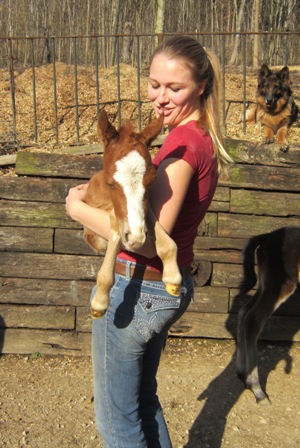How to Take Care of a Foal

A foal is a newborn horse that requires extreme care especially in the first couple of hours of birth. It is very important that a foal stands on its feet quickly after birth to indicate its mental development. Caring for a foal can be quite a challenging experience as great care and a lot of patience are required. There are different methods that can help you take care of a foal to ensure that it grows it up to become a healthy and vibrant horse.
Things Required:
– Horse Enema
– Veterinarian
– Iodine Solution
Instructions
-
1
First, you need to make sure that the foal is breathing properly after birth. You should remove the membranes from its nostrils to make it comfortable while breathing. However, if it is not breathing, you should insert a straw into the foal's nostrils until it start sneezing or you can gently slap the face to help start breathing.
-
2
Now, use the iodine to prevent septicemia which is a common infection in foals. Also, feed the foal with a bottle during regular intervals of 20 minutes until the animal stands on its feet.
-
3
Make sure you provide proper nursing to the foal for almost two hours after its birth. A foal needs to have bowel movement in the first couple of hours of its life to indicate that everything is okay and that the animal is healthy. You should give an enema during the first hour of nursing.
-
4
After a couple of hours, you should leave the foal and its mother alone. They will hopefully begin to bong with each other, which is good for the foal's development. However, you should observe carefully and immediately remove the foal if the mother starts behaving aggressively.
-
5
Now it’s time to start the imprinting process. You should spend almost 15 minutes with the foal on a daily basis. Touch its hooves, ears, nose and gently rub its whole body. It will make the foal comfortable in your presence and will become easy for you to take care of it in a proper manner.
-
6
A foal is not immune to diseases in the initial hours of its life. However, the animal gains strength that provides immunity against diseases when it feeds from its mother’s milk.
-
7
You should vaccinate the foal as per the recommendations of your veterinarian as it will help in keeping the foal free from diseases.


